SPONSORED BEACH CLEANUPS
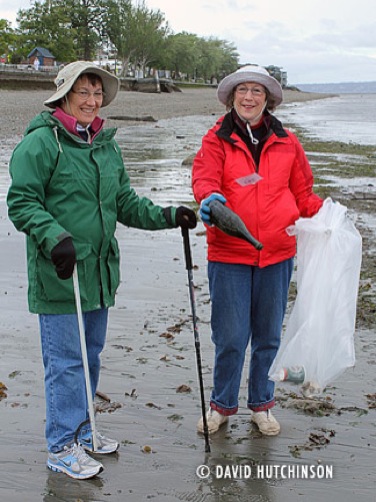 LET'S CLEAN UP OUR ACT!
LET'S CLEAN UP OUR ACT!
"Sentinels of the Sound" Beach Cleanup
Saturday, June 29, 2019, 9:30am-noon
Statue of Liberty Plaza (Alki Ave SW and 61st Ave SW) in West Seattle
co-sponsored by Seal Sitters MMSN, Sno-King MMR and SR3
RSVP here.
There will be a brief talk by Greenpeace Oceans Campaigner (and Seal Sitters volunteer) Kate Melges about the dangers of marine pollution prior to dispersing to clean up Alki Beach, adjoining sidewalks and street.
Materials will be provided, but please bring your own gloves and pickup sticks if you have them in case we have a large turnout.
Every year, Seal Sitters volunteers join together with members of the community to clean up trash and marine debris from West Seattle beaches. It's not just ugly, it's dangerous.
Volunteers don't just scour the beaches for toxic trash, but also the surrounding streets and sidewalks where thousands of cigarette butts are carelessly discarded, leaching harmful chemicals into the environment. Even though food wrappers and plastic bags may have been dropped onto a city street, they can be carried by the wind for great distances and end up in our waterways. It is estimated that up to 80% of marine debris originated on land. Learn more in-depth about the many dangers of marine debris by visiting the website section, Dangerous Waters.
People come from all over South and Central Puget Sound to participate and lend a hand to pick up dangerous trash.
Join Seal Sitters Marine Mammal Sranding Network and co-sponsors Sno-King Marine Mammal Response and SR3 and help save marine life! Special thanks to Puget Soundkeeper Alliance.
POLLUTION HAS A FACE
Since 2011, the beach cleanups are held in honor of seal pup Sandy, who died entangled in derelict fishing line, and the Arroyos gray whale, whose stomach contained only human trash and sediment. These two local marine mammals have truly put a face on pollution.

"Sentinels of the Sound" Beach Cleanup
Saturday, June 29, 2019, 9:30am-noon
Statue of Liberty Plaza (Alki Ave SW and 61st Ave SW) in West Seattle
co-sponsored by Seal Sitters MMSN, Sno-King MMR and SR3
RSVP here.
There will be a brief talk by Greenpeace Oceans Campaigner (and Seal Sitters volunteer) Kate Melges about the dangers of marine pollution prior to dispersing to clean up Alki Beach, adjoining sidewalks and street.
Materials will be provided, but please bring your own gloves and pickup sticks if you have them in case we have a large turnout.
Every year, Seal Sitters volunteers join together with members of the community to clean up trash and marine debris from West Seattle beaches. It's not just ugly, it's dangerous.
Volunteers don't just scour the beaches for toxic trash, but also the surrounding streets and sidewalks where thousands of cigarette butts are carelessly discarded, leaching harmful chemicals into the environment. Even though food wrappers and plastic bags may have been dropped onto a city street, they can be carried by the wind for great distances and end up in our waterways. It is estimated that up to 80% of marine debris originated on land. Learn more in-depth about the many dangers of marine debris by visiting the website section, Dangerous Waters.
People come from all over South and Central Puget Sound to participate and lend a hand to pick up dangerous trash.
Join Seal Sitters Marine Mammal Sranding Network and co-sponsors Sno-King Marine Mammal Response and SR3 and help save marine life! Special thanks to Puget Soundkeeper Alliance.
POLLUTION HAS A FACE
Since 2011, the beach cleanups are held in honor of seal pup Sandy, who died entangled in derelict fishing line, and the Arroyos gray whale, whose stomach contained only human trash and sediment. These two local marine mammals have truly put a face on pollution.
YOU CAN MAKE A DIFFERENCE
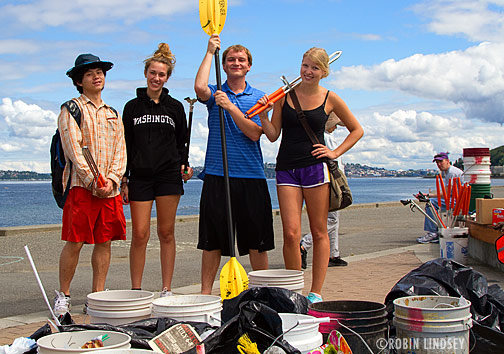 University of Washington Environmental Studies students enthusiastically pitched it to save wildlife during one of Seal Sitters' cleanups at Alki Beach (at right). Even when the shoreline seems relatively clean, it's amazing how many buckets and bags are full after a few hours work.
University of Washington Environmental Studies students enthusiastically pitched it to save wildlife during one of Seal Sitters' cleanups at Alki Beach (at right). Even when the shoreline seems relatively clean, it's amazing how many buckets and bags are full after a few hours work.
Over the past years, in excess of 800 volunteer hours have been donated by Seal Sitters volunteers and concerned residents to rid Alki and surrounding beaches, streets and sidewalks of toxic debris.
Trash on the beach becomes treacherous in the water. You can make a difference! Help keep our beaches clean and our sea life safe. Read more about marine pollution here.
EVERY DAY IS BEACH CLEANUP DAY
You don't have to wait for an organized beach cleanup to make a difference. Grab a bucket and some gloves the next time you're headed out for a beach walk and do your part. If everyone picked up just a few pieces of trash from the beach, it would help wildlife tremendously.
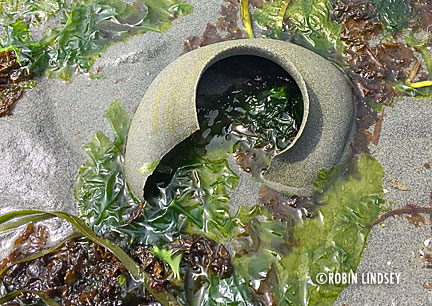 TREAD LIGHTLY AT THE BEACH
TREAD LIGHTLY AT THE BEACH
Please be careful when you pick up trash and do remember to wear protective gloves. Tread carefully over rocks and in tide pools to avoid crunching small invertebrates. Examine bottles and cans carefully before removing from the beach to make sure a crab or other small critter hasn't decided to call it "home".
Make sure you are indeed picking up trash, unlike the moon snail egg casing shown at right. Beach Naturalists are often at area beaches during extreme low ties and are a great resource for identifying intertidal invertebrates.
Read blubberblog summaries of recent cleanups below.

Over the past years, in excess of 800 volunteer hours have been donated by Seal Sitters volunteers and concerned residents to rid Alki and surrounding beaches, streets and sidewalks of toxic debris.
Trash on the beach becomes treacherous in the water. You can make a difference! Help keep our beaches clean and our sea life safe. Read more about marine pollution here.
EVERY DAY IS BEACH CLEANUP DAY
You don't have to wait for an organized beach cleanup to make a difference. Grab a bucket and some gloves the next time you're headed out for a beach walk and do your part. If everyone picked up just a few pieces of trash from the beach, it would help wildlife tremendously.

Please be careful when you pick up trash and do remember to wear protective gloves. Tread carefully over rocks and in tide pools to avoid crunching small invertebrates. Examine bottles and cans carefully before removing from the beach to make sure a crab or other small critter hasn't decided to call it "home".
Make sure you are indeed picking up trash, unlike the moon snail egg casing shown at right. Beach Naturalists are often at area beaches during extreme low ties and are a great resource for identifying intertidal invertebrates.
Read blubberblog summaries of recent cleanups below.
VOLUNTEERS KICK TRASH'S BUTT
BEACH CLEANUP HONORS SEAL PUP SANDY AND THE ARROYOS GRAY WHALE (JUNE 13, 2015)
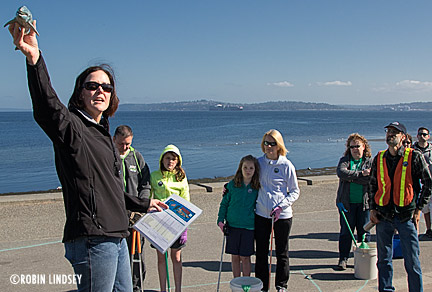 Early Saturday morning, more than 80 people from all over the region gathered at Alki to make a difference for wildlife by removing trash and debris from the beach.
Early Saturday morning, more than 80 people from all over the region gathered at Alki to make a difference for wildlife by removing trash and debris from the beach.
After a short welcoming from Seal Sitters, a heartfelt thank you was extended to PAWS Wildlife volunteers and staff who were in attendance. PAWS is a valued partner of the Marine Mammal Stranding Network as a rehab resource for harbor seal pups. Among the many West Seattle seal pups rehabilitated by PAWS was emaciated Sandy - only to die entangled in derelict fishing line after being returned to health and to the wild. Seal Sitters holds these annual cleanups in honor of Sandy and the Arroyos gray whale.
Peggy Foreman (shown above), education specialist for NOAA Fisheries, spoke about the impact of human trash on gray whales. Grays forage by scooping up large mouthfuls of sediment and water from the sea bottom and sieve small prey and crustaceans (such as tiny ghost shrimp) through their baleen. Sadly, when the ocean floor is littered with human trash, that is sucked in as well. Peggy spoke about the young gray whale who died on the beach in the Arroyos neighborhood in April of 2010. A necropsy of the thin juvenile showed virtually no food in the whale’s stomach, however, a disturbing amount of trash - plastic bags, funnel, golf ball, rope, half a pair of adult sweatpants. Peggy spread out a tarp with a representation of the trash found inside this whale; it provided a striking educational tool used to interact with the public.
Seattle Aquarium Beach Naturalist Daoud Miller pointed out the importance of making sure invertebrates were not using a piece of debris as a home before removing it from the beach. He also reminded participants that moon snail egg casings which look like trash are indeed NOT. Daoud was available throughout the morning, as was Amy Webster of PAWS, to answer questions from volunteers.
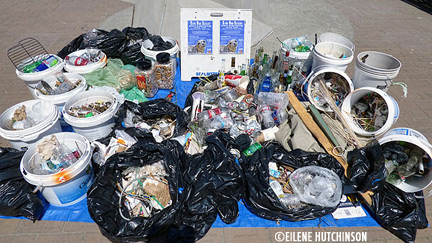 After being informed that an estimated 360 BILLION cigarette butts, which leach harmful chemicals, are discarded each year alone in the US, volunteers dispersed over what appeared to be a visibly clean beach, wearing gloves and toting buckets, bags and trash “pluckers”.
After being informed that an estimated 360 BILLION cigarette butts, which leach harmful chemicals, are discarded each year alone in the US, volunteers dispersed over what appeared to be a visibly clean beach, wearing gloves and toting buckets, bags and trash “pluckers”.
They returned lugging over 9,000 toxic butts and a sizable mass of trash (shown at right), all in less than two hours. People shouted out kudos from their cars as they drove by. Walkers strolling by the Statue Plaza were astonished at the pile that was accumulating and were so thankful for the volunteers’ great work. Some of them signed up on the spot to help out, too. It was amazing how much dangerous trash was collected in such a short time.
Seal Sitters thanks Amy, Daoud and Peggy for making our cleanup so informative. Huge thanks to all of the passionate people who made the beach a much safer home for marine life
2014 BEACH CLEANUP A SUCCESS
Early Saturday morning, June 14th of 2014, a large group of environmentally conscious volunteers from the public, PAWS Wildlife Center and Seal Sitters gathered at the base Alki Beach’s Statue of Liberty.
SS Lead Investigator Robin Lindsey and Amy Webster, PAWS Community Education Coordinator, gave a brief talk about the dangers of marine debris to wildlife.
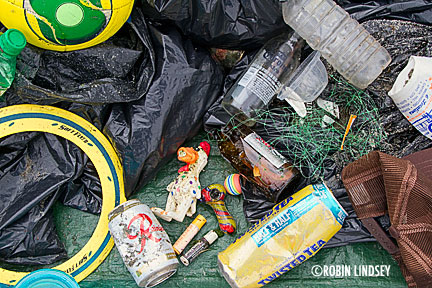 Alki Beach looked deceivingly void of trash. The day before had been dreary and rainy with few beach-goers and Parks had done its usual early morning trash pickup. However, 73 volunteers (60 adults and 13 kids) fanned out over a wide area stretching from Constellation Park to Duwamish Head and sidewalks above, armed with gloves and long tweezers to pluck trash.
Alki Beach looked deceivingly void of trash. The day before had been dreary and rainy with few beach-goers and Parks had done its usual early morning trash pickup. However, 73 volunteers (60 adults and 13 kids) fanned out over a wide area stretching from Constellation Park to Duwamish Head and sidewalks above, armed with gloves and long tweezers to pluck trash.
As volunteers returned to drop off their bags and buckets of trash, the pile grew by leaps and bounds - testimony that what appears to be a small amount of litter, indeed is very substantial.
Among the inventory of intact and broken bottles, beer and soft drink cans, more than a thousand cigarette butts (which leach harmful chemicals into the water), plastic bottles, caps and lids was a dope pipe, a very disturbing 6 hypodermic needles (found in differing locations), a sizable blanket (large enough to potentially kill a gray whale if swallowed), auto tire, part of a boat, chains, and remnants of gill net (extremely dangerous to marine mammals and sea birds).
Thanks to the many volunteers who together donated 154.25 hours combing the beaches, seawalls and streets and sidewalks along our westside shoreline.
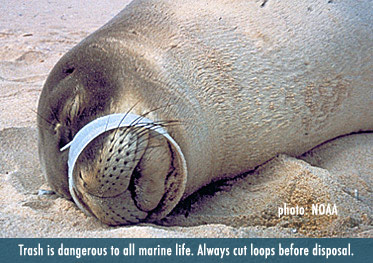 Seal Sitters' 2013 educational outreach project Year of the Seal: Sentinels of the Sound was intended to raise awareness of the impact that humans have on our fragile marine ecosystem.
Seal Sitters' 2013 educational outreach project Year of the Seal: Sentinels of the Sound was intended to raise awareness of the impact that humans have on our fragile marine ecosystem.
That awareness campaign continues each day that volunteers and the public spread the message that litter and pollution is deadly to marine life. The knowledge that we can truly make a difference allows us to have hope for future generations of wildlife.
BEACH CLEANUP HONORS SEAL PUP SANDY AND THE ARROYOS GRAY WHALE (JUNE 13, 2015)

After a short welcoming from Seal Sitters, a heartfelt thank you was extended to PAWS Wildlife volunteers and staff who were in attendance. PAWS is a valued partner of the Marine Mammal Stranding Network as a rehab resource for harbor seal pups. Among the many West Seattle seal pups rehabilitated by PAWS was emaciated Sandy - only to die entangled in derelict fishing line after being returned to health and to the wild. Seal Sitters holds these annual cleanups in honor of Sandy and the Arroyos gray whale.
Peggy Foreman (shown above), education specialist for NOAA Fisheries, spoke about the impact of human trash on gray whales. Grays forage by scooping up large mouthfuls of sediment and water from the sea bottom and sieve small prey and crustaceans (such as tiny ghost shrimp) through their baleen. Sadly, when the ocean floor is littered with human trash, that is sucked in as well. Peggy spoke about the young gray whale who died on the beach in the Arroyos neighborhood in April of 2010. A necropsy of the thin juvenile showed virtually no food in the whale’s stomach, however, a disturbing amount of trash - plastic bags, funnel, golf ball, rope, half a pair of adult sweatpants. Peggy spread out a tarp with a representation of the trash found inside this whale; it provided a striking educational tool used to interact with the public.
Seattle Aquarium Beach Naturalist Daoud Miller pointed out the importance of making sure invertebrates were not using a piece of debris as a home before removing it from the beach. He also reminded participants that moon snail egg casings which look like trash are indeed NOT. Daoud was available throughout the morning, as was Amy Webster of PAWS, to answer questions from volunteers.


They returned lugging over 9,000 toxic butts and a sizable mass of trash (shown at right), all in less than two hours. People shouted out kudos from their cars as they drove by. Walkers strolling by the Statue Plaza were astonished at the pile that was accumulating and were so thankful for the volunteers’ great work. Some of them signed up on the spot to help out, too. It was amazing how much dangerous trash was collected in such a short time.
Seal Sitters thanks Amy, Daoud and Peggy for making our cleanup so informative. Huge thanks to all of the passionate people who made the beach a much safer home for marine life
2014 BEACH CLEANUP A SUCCESS
Early Saturday morning, June 14th of 2014, a large group of environmentally conscious volunteers from the public, PAWS Wildlife Center and Seal Sitters gathered at the base Alki Beach’s Statue of Liberty.
SS Lead Investigator Robin Lindsey and Amy Webster, PAWS Community Education Coordinator, gave a brief talk about the dangers of marine debris to wildlife.

As volunteers returned to drop off their bags and buckets of trash, the pile grew by leaps and bounds - testimony that what appears to be a small amount of litter, indeed is very substantial.
Among the inventory of intact and broken bottles, beer and soft drink cans, more than a thousand cigarette butts (which leach harmful chemicals into the water), plastic bottles, caps and lids was a dope pipe, a very disturbing 6 hypodermic needles (found in differing locations), a sizable blanket (large enough to potentially kill a gray whale if swallowed), auto tire, part of a boat, chains, and remnants of gill net (extremely dangerous to marine mammals and sea birds).
Thanks to the many volunteers who together donated 154.25 hours combing the beaches, seawalls and streets and sidewalks along our westside shoreline.

That awareness campaign continues each day that volunteers and the public spread the message that litter and pollution is deadly to marine life. The knowledge that we can truly make a difference allows us to have hope for future generations of wildlife.